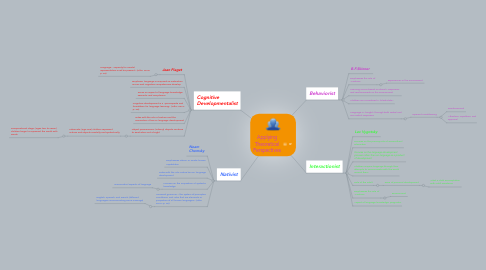Applying Theoretical Perspectives
저자: Toishema Holley


1. Cognitive Developmentalist
1.1. Jean Piaget
1.1.1. Language: "capacity for mental representation must be present" (Otto, 2010, p. 30)
1.2. Emphasis: language is acquired as maturation occurs and cognitive competencies develop
1.3. Focus on aspect of language knowledge- semantic and morphemic
1.4. Cognitive development is a "prerequisite and foundation for language learning" (Otto, 2010, p. 30).
1.5. Sides with the role of Nature and the connection it has on language development
1.6. Object permanence: (infancy) objects continue to exist when out of sight
1.6.1. Schemata: (age one) children represent actions and objects mentally and symbolically
1.6.1.1. Preoperational stage: (ages two to seven) children begin to represent the world with words
2. Nativist
2.1. Noam Chomsky
2.2. Emphasizes inborn or innate human capabilities
2.3. Sides with the role nature has on language development
2.4. Focuses on the acquisition of syntactic knowledge
2.4.1. Grammatical aspects of language
2.5. Universal grammar: "the system of principles, conditions, and rules that are elements or properties of all human languages" (Otto, 2010, p. 28).
2.5.1. English, Spanish, and French (different languages communicating same message)
3. Behaviorist
3.1. B.F.Skinner
3.2. Emphasizes the role of "Nurture"
3.2.1. Experiences in the environment
3.3. Learning occurs based on stimuli, responses, and reinforcements in the environment
3.4. Children are considered a "blank-slate"
3.5. Language is "taught" through both verbal and non-verbal responses
3.5.1. Operant Conditioning
3.5.1.1. Reinforcement
3.5.1.2. Attention, repetition, and approval
4. Interactionist
4.1. Lev Vygotsky
4.2. Focuses on the primary role of sociocultural interaction
4.3. Focuses on the language development process rather than on language as a product of development
4.4. Children acquire language through their attempts to communicate with the world around them
4.5. Role of the adult
4.5.1. Zone of proximal development
4.5.1.1. What a child accomplishes with adult assistance
4.6. Emphasizes the role of "Nurture"
4.6.1. Environment
